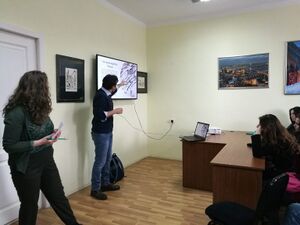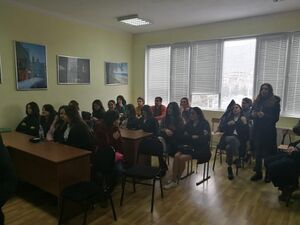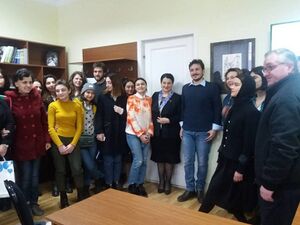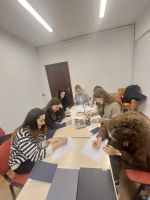Borders and frontiers, the past, the present and the future: comparative history and international relations between Italy and Georgia at the Sokhumi State University
| Title | Borders and frontiers, the past, the present and the future: comparative history and international relations between Italy and Georgia at the Sokhumi State University |
|---|---|
| Author | Mattia Baldoni |
| Date | 2018-12-21 |
Tbilisi, 21st December 2018
The second conference, at Sokhumi State University, was held in front of 30 people, among students and professors.
The topic was the same, just with little variations required by the professor Maia Jijava. She suggested to Mattia to insert some references and slides about an argument very interesting for students of this university in exile, that is the birth of regional autonomies and minority problems in Italy and the case-study of Trentino Alto-Adige.

Mattia agreed, highlighting historical aspects and how this subject became important during the World War I. He showed how the so called “unredeemed lands” (“terre irredente”) were more than those really inhabited by Italians. Comparing Austrian Empire’s ethnic composition and “Unredeemed lands”, Mattia showed the asymmetry between what Italy claimed and the status-quo. Trentino Alto-Adige is a perfect example of that. In fact, till today, people living in the northern part of this region (Sud-Tirol) is 90-95% German mother-tongue.
This aspect, linked to the special status of “autonomous Region”, appeared to be very interesting for students and professors, most of them being from the region of Abkhazia, occupied by Russian Forces.
At the end of the presentation they asked a lot of questions about this theme. One of the questions was: how the autonomy’s concept is developed and what kind of political and administrative institutions were created to guarantee the survival of this minority?
Mattia underlined the fact that, first, Trentino Alto-Adige is not an “autonomous Republic”. Italy is not a Federal Republic, so all regions are formally equal, except those with “special status”. This legislative particularity allows them a greater autonomy in economical and administrative subjects, but they have the same rights and duties of the other Regions as member of the Italian Republic.

Unfortunately, there was few time to answer deeply all the questions, so prof. Jijava, Mattia and Gabriele Rota agreed to organize other meetings to talk about these themes. The audience and professors in the room were as well very enthusiastic about this possibility.
A very cultured professor of History [name to be retrieved] posed significant questions and was very interested in the Italian debate between Interventionists and Pacifists before the war, asking more detail about the composition of these two line-ups.
Mattia was surprised by professor’s detailed knowledge of Italian historical events and people, and they engaged an interesting discussion. On the other hand, the same professor congratulated Mattia for his clear and well-exposed presentation about Georgian history. He was impressed by the fact that an Italian scholar had a so clear and correct understanding of this complex subject of Georgian history.

At the end of both conferences, participants took pictures with the two EVS Volunteers, inviting them for future meetings.









